#writing OCs tips
Explore tagged Tumblr posts
Text
Describe your Main Character sheet
Skin
Tone: Pale, Rosy, Olive, Dark, Tanned, Alabaster, Ebony, Bronze, Golden, Fair
Texture: Smooth, Rough, Silky, Coarse, Flaky, Supple, Wrinkled, Calloused, Bumpy
Condition: Moles, Acne, Dry, Greasy, Freckled, Scars, Birthmarks, Bruised, Sunburned, Flawless
Complexion: Clear, Ruddy, Sallow, Glowing, Dull, Even-toned, Blotchy
Eyes
Size: Small, Large, Average, Tiny, Bulging, Narrow
Color: Grey, Brown, Blue, Violet, Pink, Green, Gold, Hazel, Crimson, Amber, Turquoise, Sapphire, Onyx
Shape: Doe-eyed, Almond, Close-set, Wide-set, Round, Oval, Hooded, Monolid
Expression: Deep-set, Squinty, Monolid, Heavy eyelids, Upturned, Downturned, Piercing, Gentle, Sparkling, Steely
Other: Glassy, Bloodshot, Tear-filled, Clear, Glinting, Shiny
Hair
Thickness: Thin, Thick, Fine, Normal
Texture: Greasy, Dry, Soft, Shiny, Curly, Frizzy, Wild, Unruly, Straight, Smooth, Wavy, Floppy
Length: Cropped, Pixie-cut, Afro, Shoulder length, Back length, Waist length, Past hip-length, Buzz cut, Bald
Styles: Weave, Hair extensions, Jaw length, Layered, Mohawk, Dreadlocks, Box braids, Faux locks, Braid, Ponytail, Bun, Updo
Color: White, Salt and pepper, Platinum blonde, Golden blonde, Dirty blonde, Blonde, Strawberry blonde, Ash brown, Mouse brown, Chestnut brown, Golden brown, Chocolate brown, Dark brown, Jet black, Ginger, Red, Auburn, Dyed, Highlights, Low-lights, Ombre
Eyebrows: Thin eyebrows, Average eyebrows, Thick eyebrows, Plucked eyebrows, Bushy eyebrows, Arched eyebrows, Straight eyebrows
Lips
Shape: Full, Thin, Heart-shaped, Bow-shaped, Wide, Small
Texture: Chapped, Smooth, Cracked, Soft, Rough
Color: Pale, Pink, Red, Crimson, Brown, Purple, Nude
Expression: Smiling, Frowning, Pursed, Pouting, Curved, Neutral, Tight-lipped, Parted
Nose
Shape: Button, Roman, Hooked, Aquiline, Flat, Pointed, Wide, Narrow, Crooked, Upturned, Snub
Size: Small, Large, Average, Long, Short
Condition: Freckled, Sunburned, Smooth, Bumpy
Build
Frame: Petite, Slim, Athletic, Muscular, Average, Stocky, Large, Lean, Stout, Bony, Broad-shouldered, Narrow-shouldered
Height: Short, Tall, Average, Petite, Giant
Posture: Upright, Slouched, Rigid, Relaxed, Graceful, Awkward, Stiff, Hunched
Hands
Size: Small, Large, Average, Delicate, Strong
Texture: Smooth, Rough, Calloused, Soft, Firm
Condition: Clean, Dirty, Manicured, Scarred, Wrinkled
Nails: Short, Long, Polished, Chipped, Clean, Dirty, Painted, Natural
Voice
Tone: Deep, High, Soft, Loud, Raspy, Melodic, Monotonous, Hoarse, Clear, Gentle
Volume: Loud, Soft, Whispery, Booming, Muted
Pace: Fast, Slow, Steady, Hasty, Measured
Expression: Cheerful, Sad, Angry, Calm, Anxious, Confident, Nervous, Excited, Bored
#writing#writer on tumblr#writerscommunity#writing tips#character development#writing advice#oc character#writing help#writer tumblr#writblr#character sheet
9K notes
·
View notes
Text
50 Character Personality Traits + Meanings (For writers, worldbuilders, and artists) Part 1
Adventurous - Enjoys trying new experiences and exploring the unknown.
Ambitious - Driven to succeed and achieve their goals.
Analytical - Tends to think critically and examine things in-depth.
Artistic - Highly creative and expresses themselves through artistic mediums.
Assertive - Confident in expressing their thoughts and feelings.
Caring - Shows compassion and concern for the well-being of others.
Charismatic - Has a natural charm and appeal that draws people in.
Clever - Able to come up with creative solutions and make astute observations.
Compassionate - Displays empathy and a desire to help those in need.
Confident - Believes in their own abilities and is self-assured.
Conscientious - Reliable, responsible, and attentive to detail.
Curious - Eager to learn new things and explore the world around them.
Cynical - Tends to be skeptical and distrustful of others' motives.
Dependable - Can be counted on to follow through on their commitments.
Determined - Persistent in pursuing their goals and overcoming challenges.
Diplomatic - Skilled at navigating social situations and resolving conflicts.
Eccentric - Displays unconventional or unusual behaviors and interests.
Empathetic - Able to understand and share the feelings of others.
Ethical - Guided by a strong moral compass and a sense of right and wrong.
Extraverted - Enjoys being around people and draws energy from social interactions.
Flexible - Adaptable to changes and open to trying new approaches.
Forgiving - Willing to let go of past hurts and give people second chances.
Friendly - Approachable and enjoys building positive relationships with others.
Grounded - Practical, down-to-earth, and focused on the present.
Hardworking - Diligent and dedicated in their efforts to achieve their goals.
Honest - Values truthfulness and integrity in their words and actions.
Idealistic - Driven by a vision of how the world should be and a desire to make a difference.
Imaginative - Possesses a rich inner world and creative problem-solving abilities.
Independent - Prefers to think and act for themselves without relying on others.
Indecisive - Struggles with making decisions and often second-guesses themselves.
Introverted - Finds energy and fulfillment in solitary activities and introspection.
Jealous - Experiences feelings of resentment or insecurity towards others.
Kind - Gentle, considerate, and thoughtful in their treatment of others.
Leaders - Able to inspire and guide others towards a common goal.
Logical - Approaches problems and decisions through a rational, analytical lens.
Materialistic - Highly values the acquisition of possessions and wealth.
Organized - Maintains order and efficiency in their personal and professional life.
Perfectionistic - Strives for flawlessness and can be overly critical of themselves and others.
Pessimistic - Tends to focus on the negative aspects of situations and expect the worst.
Resilient - Able to bounce back from setbacks and adapt to changes.
Risk-taker - Willing to take chances and step outside of their comfort zone.
Sarcastic - Uses irony and witty remarks to convey their thoughts and feelings.
Sensitive - Deeply affected by the emotions and experiences of themselves and others.
Stubborn - Unwilling to change their mind or compromise on their beliefs and opinions.
Suspicious - Inclined to doubt the motives and intentions of others.
Thoughtful - Considerate of the impact their words and actions have on others.
Timid - Shy, reserved, and hesitant to take risks or assert themselves.
Trustworthy - Reliable, honest, and worthy of confidence.
Unpredictable - Displays an element of surprise and spontaneity in their behavior.
Witty - Possesses a quick, clever, and humorous way of expressing themselves.
Hey fellow writers! I'm super excited to share that I've just launched a Tumblr community. I'm inviting all of you to join my community. All you have to do is fill out this Google form, and I'll personally send you an invitation to join the Write Right Society on Tumblr! Can't wait to see your posts!

#creative writing#writeblr#writing#thewriteadviceforwriters#on writing#writing tips#writers block#how to write#writers and poets#authors on tumblr#author#fiction#women writers#book writing#writer#writing advice#novel writing#writing blog#writer stuff#writers#writerscommunity#artists on tumblr#small artist#oc artist#world building#writersblock#writers on tumblr#helping writers#resources for writers#writerslife
4K notes
·
View notes
Text
Get to Know Your Character
Here are some questions to consider for character development:
What parts of their childhood trigger them?
How do they treat themselves when they're feeling sad?
What parts of themselves do they tend to hide?
How do they punish themselves when they make mistakes?
Who are they loyal to? Why?
Who do they avoid? Why?
What emotions or situations do they try to avoid? Why?
What angers them?
What are their insecurities?
What are their emotional triggers?
How do they feel about love?
What are their fears?
What is their relationship with their family like?
What kind of people do they tend to gravitate towards?
What do they like/dislike about themselves?
Happy writing ❤
Previous | Next
#writeblr#writing#writing tips#writing help#writing resources#creative writing#character development#oc development#ask game#deception-united
4K notes
·
View notes
Text
practical writing advice part 2
part 1
get used to carrying a notebook around with you. or get used to writing on your phone. you will not always have access to your computer, but it’s much easier to take something compact with you to quickly jot down ideas. also i have chronic illness and sometimes my bones feel like lead and going upstairs to get my laptop is a herculean task, BUT i can write on my phone lying down instead of just scrolling through my camera roll and being miserable. which brings me to my next point:
if you have to choose between writing unconventionally or even unproductively and not writing at all, choose the writing. i’ve said before not to create a habit of writing in bed, but if it comes down to writing in bed or not writing whatsoever, i’ll write in bed. i just try to stretch before and after (which you should also do!!!).
you’re not wasting time or being silly by making playlists or moodboards or memes of your characters and environments. having fun with your stories outside of writing them is a good way to stay motivated.
i like to stop my writing sessions in a place where i know exactly what i want to write next, so when i pick back up i won’t be left hemming and hawing over where to begin. HOWEVER, if you’re absolutely locked in, don’t interrupt that flow state. it’ll be harder to find it again later—instead, wait until you find a natural place to stop where you haven’t run out of ideas.
“why do i have a headache 3 hours into my writing session?” because the last time you had a sip of water was 4 hours ago, you dingus! keep your drinks near your workspace while you write. and i do mean, like, a full bottle of water at least. if you’re like me, things stop existing when they leave your line of sight, so keep these beverages where you can see them and refill during bathroom breaks.
uhhh try not to think negatively about your writing while you’re doing it because when i do that i just get bummed out. “this scene is terrible” -> “oh yeah fuck it up oh yeah fuck it up” (positive reframing)
ok thanks bye
#🌿 writing#writing tips#writing advice#writeblr#writerblr#writers on tumblr#you might be asking yourself: can so many ocs shut the fuck up#and the answer is no
2K notes
·
View notes
Text
Writing a Manipulative Character
- A manipulative character is a master of influence, skilled at bending others to their will without them even realizing it. Show their ability to read people, understanding their desires, fears, and weaknesses, and then use this knowledge to subtly guide their actions and decisions.
- These characters often present a facade of charm and trustworthiness. Highlight their charismatic nature and how they can easily win people over, making others believe that they have their best interests at heart, while secretly pulling the strings.
- A manipulative character is adept at creating and controlling narratives. Demonstrate their talent for spinning stories, spreading misinformation, and planting seeds of doubt to achieve their objectives. They always have a backup plan and can think several steps ahead.
- They thrive on secrecy and deception. Illustrate how they carefully conceal their true intentions and motives, keeping their schemes hidden while appearing innocent or even benevolent. They might use half-truths and strategic omissions to maintain control.
- Show their capacity for patience and strategic thinking. A manipulative character knows that some plans take time to come to fruition. They are willing to wait, gradually nudging events and people in their desired direction until they achieve their goal.
- Highlight their emotional intelligence. These characters can read a room, detect subtle shifts in mood, and adjust their approach accordingly. They know exactly when to apply pressure, offer comfort, or feign vulnerability to manipulate others.
- They often exploit relationships and social dynamics. Depict how they use friendships, family ties, and professional connections to their advantage, playing people against each other or leveraging loyalty and trust to further their own ends.
- A manipulative character is skilled at deflecting blame and responsibility. Show how they can twist situations to make others seem at fault, creating scapegoats or diverting attention from their own actions. They are experts at maintaining a clean image while orchestrating chaos behind the scenes.
- They use flattery and validation as tools. Illustrate their ability to make others feel special, understood, and valued, all the while steering them towards choices that serve the manipulator's agenda.
- Lastly, demonstrate the manipulative character's adaptability. They can quickly change tactics if their initial approach fails, always finding new ways to influence and control those around them. They are chameleons, constantly adjusting their persona to fit the needs of the moment.
#writer#writing#writer things#writerblr#writerscorner#writing inspiration#writing tips#author#writers and poets#ao3 writer#writeblr#writing community#writers on tumblr#writer stuff#writers block#writer problems#writing inspo#creative writing#oc#original character#writerscommunity#writing prompt#writing advice
839 notes
·
View notes
Text
Want simple tips to heavily improve your skills with character voice??
(📝Note: character voice is the way you convey your character's personality though their pov or dialogue when you write. No two characters speak the same📝)
I speak from experience when I say character voice is hard to get right. Characters, like people, have lots of layers that affect the way they see the world around them and how they interact with other characters. That's why character voice is so important in stories, and why if you write it in a compelling and effective way it will hook people into your story. I hope you learn something new in this post!!
When writing character voice, there's a list of things that you should take into account:
Where are they from? Their past and what they've lived plays a huge part in character voice. Maybe your character grew by the ocean, and so they compare things from the present to the beach, the rocks or the sea itself. You will rarely read about a sailor that is an expert in pants and compares scents to flowers. They might, instead, talk about how a house smells like the wet wood of a ship.
Think about how their personality shapes their language. If they are insecure, they might end most of their sentences with "isn't it?" or "right?" and ask a lot of questions, whereas if you have a confident character, you might find them saying things like "we should do this" or "that will be fun" instead.
What their "lense" is. This is more of an ethic aspect of the character. What have they learn it's okay, and what do they find uncomfortable? Would they find it gross if their friend left laundry on the floor?
Give them special traits (both for dialogue and narration). Maybe character A quotes a lot when they narrate and uses long paragraphs, or maybe B speaks about their past a lot and uses popular sayings. Personally, one character of mine has the tendency to repeat himself when he speaks, as in "yeah, yeah, I'll do it" or "no, no, no. Never" because he is really enthusiastic, and it fits really well with his character.
Pay attention to how they would talk about themselves. Maybe your character doesn't like people to know they're sad because it makes them feel vulnerable, so they will just say they feel annoyed or don't want to talk in that moment. This also means that they will not tell the reader something they are not comfortable saying in the first place.
How is their education? Education is also very important in this context. Did they went to university and have a rich vocabulary and structured sentences, or where they rised in a little farm far from town? You can also play with both a bit: maybe your character did go to university, but maybe they also came from a low income family, and characteristic of both things merge when they talk. Example: long, structured, sentences but a simple and sight forward vocabulary.
That's all for now and happy writing!!
Other tips for writers: previous | next
#writeblr#writing#writer#writers#writers of tumblr#writers on tumblr#writerscommunity#creative writing#character development#current wip#tips for writers#writing tips#tips#main character#original character#character dynamics#oc#ocs#writing advice
3K notes
·
View notes
Text
What you HAVE TO know about your characters
Name:
Appearence:
Age:
Role:
Why the have that role, not based on the plot but based on the characters core beliefs and how that affects the plot:
Beliefs:
Motivations:
Who they were raised to be vs who they are/are becoming:
Plans for the future:
How they feel about themselves and how it affects their behavior:
Why do they even matter:
#creative writing#writing blog#writers#writerslife#writing advice#young writer#writblr#writers on tumblr#writerscommunity#am writing#writing#writers and poets#writeblr#female writers#author#writing tips#writing tings#character writing#character development#character design#writing help#oc#my ocs#original character
1K notes
·
View notes
Text
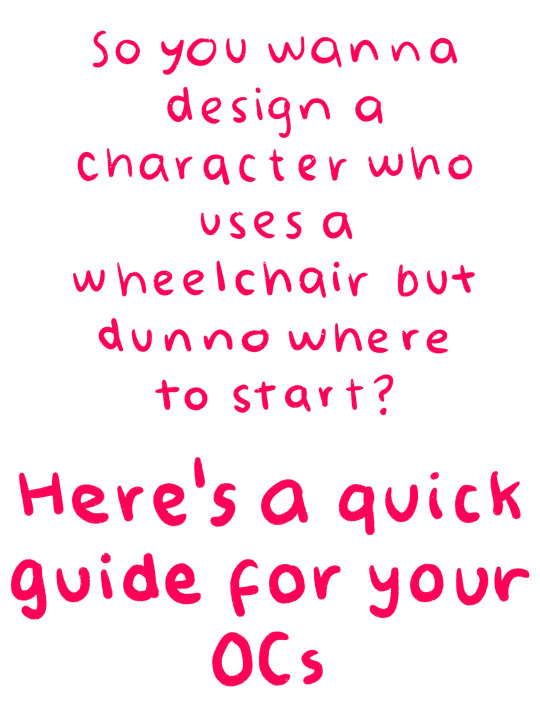
OC WHEELCHAIR GUIDE
I remade this guide to be a bit easier to read, less info dumping, a bit more specific info and stuff for you to understand, and also some stuff to help people decide which chair would be best for their characters!
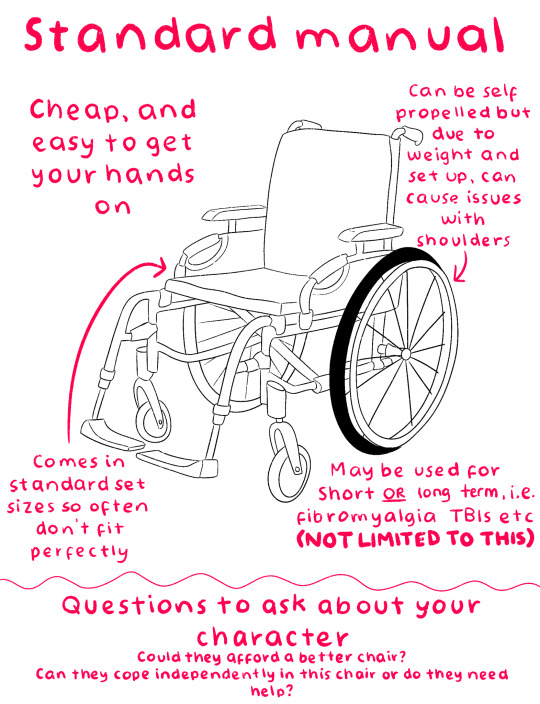
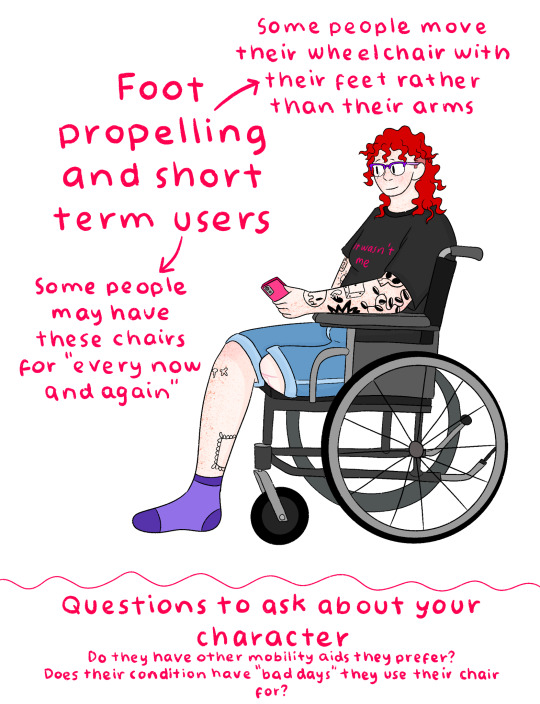
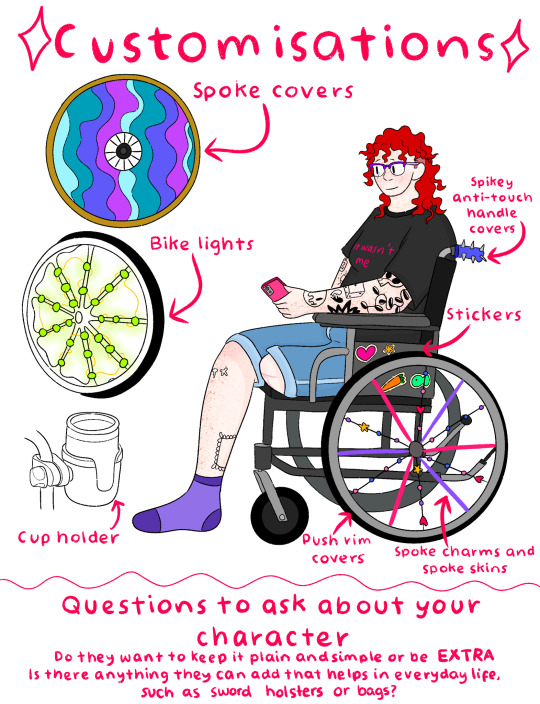
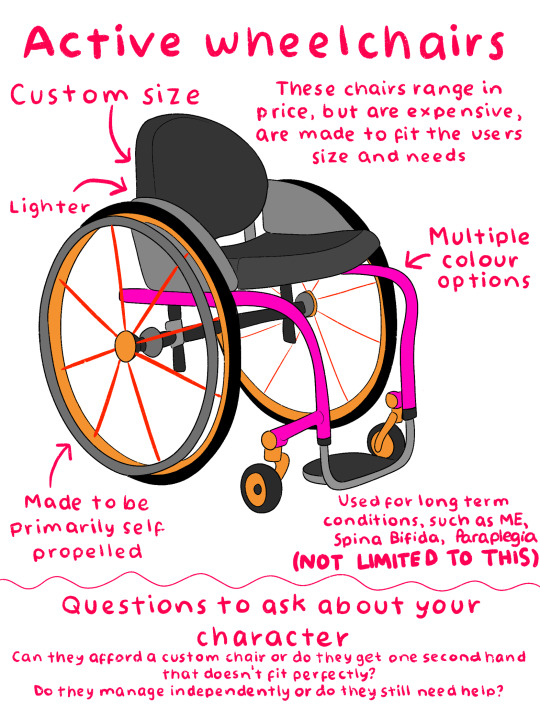
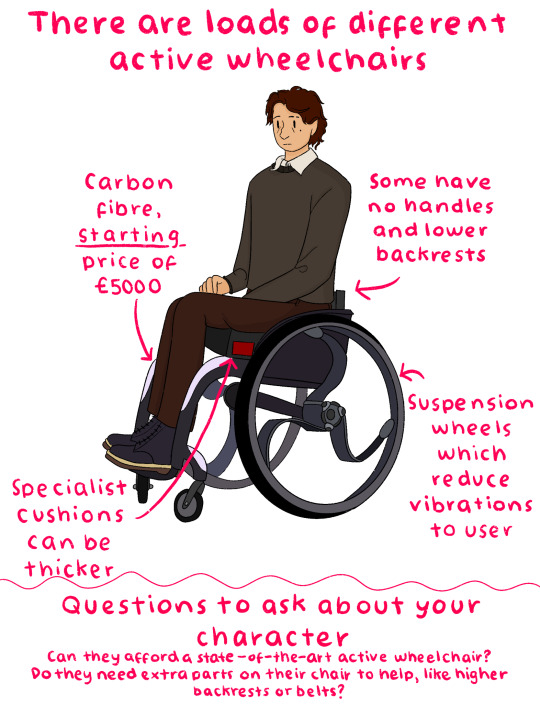
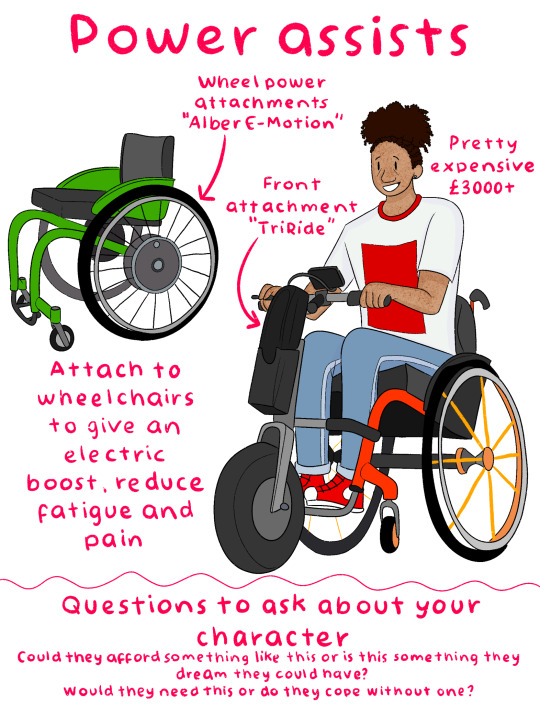



#art#original art#artist#queer#oc art#original character#disabled#disabled rights#disability#disability pride month#oc#oc guide#character guide#writing tips#character tips#author tips#tutorial#art tutorial
466 notes
·
View notes
Text
Avoiding therapy speak in writing
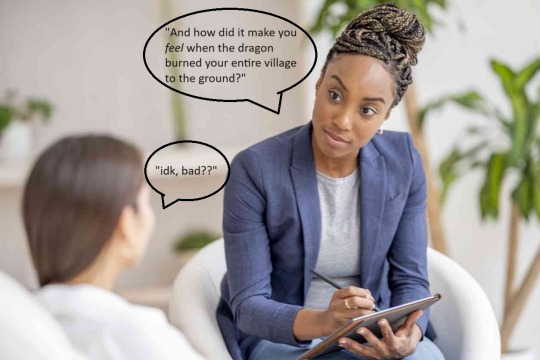
I think we all know by now that therapy speak is irritating and unrealistic, especially if you are writing in a fantasy world that doesn't even have modern psychology.
Part of the reason that it is so annoying is that it is the definition of telling instead of showing: characters are just plainly informing us of their feelings rather than making us work for a better understanding. It's cheap and boring. Instead of making your characters seem like complex individuals with their own hangups and difficulties, they seem like plot points programmed to tell us things.
But obviously, you want to put these people in situations and have them talk about it! How do you do that without sounding maudlin? Here are some options.
Listen to real arguments/conversations
I cannot stress enough how important it is to listen to how actual real human beings talk to each other during heightened emotional states. They don't have to be nasty abusers, and they don't have to be perfect angels, just everyday people doing their normal thing.
Of course, I'd hope you're not seeing people argue all the time, but if you do happen to see it, listen carefully and notice how people actually address their problems. Think back to tough conversations that you have had, even if you wouldn't classify them as arguments. Consider how people acted and reacted to one another. Notice how normal humans talk about issues outside of therapy, even intelligent and emotionally evolved people.
I've had years of therapy, and even I do not talk in therapy ways about my issues when I'm talking to my family or friends. It just feels cheesy and fake outside of that particular setting - plus, it freaks other people out and can seem kind of manipulative. Try talking like that in a real conversation and see how uncomfortable it is. You'll understand why avoiding therapy speak is important.
Consider the character's own hangups
Just as everyone has their own unique speaking style and mindset, so do we all have our own argument styles. These are often informed by our pasts and upbringing; they are as varied as our own histories. However, there are a few different options.
Someone with a happy upbringing may be more assertive and willing to address their problems because they had that demonstrated to them as children.
A spoiled child will grow up to be a demanding adult who refuses to give any quarter.
Those who got yelled at a lot as children may shut down and fawn to avoid getting hurt.
Someone who grew up in a violent household may mimic that behavior and get incredibly aggressive when upset.
Individuals whose parents didn't teach them emotional regulation will lash out and get loud.
Manipulative people may stay very calm and gaslight the other person, or they may get hysterical to garner sympathy and make people focus on comforting them.
Someone who has gone to therapy may revert to their original argument style, or they may imperfectly apply what they have learned in a way that feels a bit unnatural. They may start out with rage, then force themselves to calm down through grounding techniques.
People who have been coached through previous emotional outbursts could demand a time out, then fail to actually calm themselves down.
Some may refuse to acknowledge they are upset and insist, in increasingly forceful terms, that they are fine.
Others may get quiet or crack a joke to ease the tension, but it doesn't really help.
Keep each confrontation short
IRL, emotional confrontations are generally not that long. They don't go on for hours and hours, though it can feel that way. No one is going on and on about their feelings and sharing every little detail of how they feel (at least not that I know of personally, maybe other people are different).
Even the worst arguments I have had, the real nexus of the argument was maybe an hour or two, though the fallout lasted much longer. I'd say there was an hour maximum of real, active confrontation, preceded or followed by hours/days/weeks of simmering frustration.
Why? Because arguments are exhausting. You don't have the energy for that in the heat of the moment. Yes, feuds and fights can last years, but each actual confrontation is short.
For longer, more serious issues, hash it out over a few sessions rather than all at once. It's rare to get everything out of the way immediately unless the characters already have a strong, loving relationship.
Show incongruencies
Especially for more reserved people, they will likely have their emotions leaking all over the place but won't actually say anything. As such, focus on body language while keeping the conversation more focused on the plot. For example, Character A might be crying but still trying to argue their point about whatever is going on.
Address physical complaints instead of emotional ones
In many cases, people will use "I'm tired" or "I didn't sleep well" or "I'm not feeling great" as shorthand for whatever is actually bothering them. It relieves pressure by not making them talk about upsetting matters while still addressing their discomfort in some form.
You should also consider the fact that some people can't connect physical sensations to feelings, so they may genuinely feel ill and not really understand why. This is especially common in people who can't emotionally regulate or have been through trauma.
For myself, I tend to somatize my feelings, so I might not feel upset, but I will feel physically sick. My stomach will hurt, my chest will get tight, or I'll get a headache, but my emotional state will seem calm. This isn't all that unusual, and many people experience this to different degrees.
As such, you can have your character say that their stomach hurts, or that they have a headache and can't discuss this anymore, or that they need to go lie down because they're dizzy. If we know they're relatively healthy, this can be a clue that they're getting overwhelmed but either cannot pinpoint their emotions or don't want to discuss them.
Let characters advance and retreat
A lot of the time, someone will address a scary emotion and then retreat again, sometimes over a period of hours, days, or even weeks. This is normal: most of us don't have the emotional fortitude to forge ahead through something difficult all in one go. Character A may say something vulnerable, then change the topic, laugh it off, say they're done discussing it, or even leave the situation.
Leave emotions partially unaddressed
Again, it's rare for someone to spill out everything they're feeling all in one go. As such, have Character A address the most important thing - or the least important, depending on their level of emotional maturity - and let it be done for then.
They might say their small piece, but when someone tries to probe deeper, they don't have an answer, or they get "stuck" on that one emotional level and cannot go further.
If Character B keeps pushing, then they may get incredibly upset and push back, or retreat.
Have Character B point out the feelings
Works especially well if the other character is a close companion or a parental figure. Often, people who know us really well will have better insight into our emotions than we do. Or, we might have good insight into our emotions but are still too afraid to open up. Having Character B point out the issue gives Character A grace to be more honest.
I can't tell you how many times I've been really upset, so I've distracted from the issue by getting angry about something completely different. Then, my mom will gently point out that I'm not actually crying about my new plastic cup being broken or whatever; I'm actually upset about XYZ. In that moment, I realize I've been caught out and admit that yes, that's what I'm really upset about.
Have Character A address it with a third character
Who among us hasn't gone to someone else to talk about our feelings? Having a third party serve as a sounding board is normal. Sometimes, Character A will feel such catharsis from this conversation that they don't address it as thoroughly with Character B.
Of course, you can use this to your advantage and create more tension if the third character gives bad advice or is biased.
Remember that just because the third party responded well does not mean that Character B does. You also have to avoid omniscience and remember that Character B wasn't privy to that conversation.
Have one confrontation be a stand-in for a larger one
I always think about the "The Iranian Yogurt Is Not the Issue" post when I think about this. Often times, things like not doing the dishes or whatever aren't actually the big deal: it's lack of boundaries, communication, or respect. A minor argument can be shorthand for a larger one that is too challenging for the characters to tackle.
This isn't just creating drama for the hell of it, though; it's about exploring the larger issues without making the characters lay it out on the table. A good reader will be able to see it's not about the Iranian Yogurt as long as you set up the relationship well.
Currently, I am writing a story where Uileac and his sister Cerie go to rescue Uileac's husband, Orrinir. On the way there, Uileac idly comments on how he wonders where a waterfall comes from because he's trying to distract himself from thinking about the fact that his husband is kidnapped and possibly dead.
Cerie, being pretty wound up too, starts arguing with him about it because she's like "why is this relevant? We're kind of too busy to think about geology right now!" Uileac gets annoyed at her for being so aggro, and she gets annoyed at him for being so irreverent. Both of them are upset about something completely different, but they're too scared and panicked to actually address that, so they release their frustrations by complaining about waterfalls.
Those bad vibes have to go somewhere, but neither of them are very good at talking about their feelings (though very good at stuffing them down). As such, they take the pressure off by sniping at one another. You've probably done this too, when you get into a dumb argument about something absolutely pointless because there's something you don't feel strong enough to discuss.
There's also the fact that if you're mad at someone about something but feel it's too stupid or petty to discuss, that frustration will leak out and everything else they do will annoy you, leading to a bunch of irrelevant arguments.
Use "reaffirmation" gestures
I talked about this in a different post, but after an argument, the "make up" stage doesn't always involve going "ohhh I forgive you" and big hugs and kisses, especially when the two characters aren't emotionally mature.
Instead, Character A makes gestures that reaffirm the relationship. This could be offering to do something Character B needs, making plans for later, or changing the topic to discuss something the other character cares about ("how are your cats doing?") etc.
Note that these "reaffirmation" gestures aren't the same as the cycle of abuse. This is more when two characters have had a difficult emotional conversation but aren't really sure how to continue being emotionally open, so they revert to something safer that still shows they care. They're not over-the-top gestures either, but more a special attention to something the other person loves. Knowing what the other person loves also demonstrates the depth of their relationship.
As always, I can't tell you what to do with your writing.
You are the crafter of your own story, and if you want people to talk like therapists for whatever reason, that's your choice. However, we want characters to feel like real people, and most real people don't lay it all out on the table every single time they're upset. If they do, they might be trauma vomiting, which is icky in and of itself.
Healthy communication isn't always perfect communication. People can have strong, loving relationships and still get things wrong - we're human. Having people calmly and rationally and easily talk about their feelings every single time is not only kind of boring, but it also feels weird, because unless we're primed to discuss those difficult topics and know we're perfectly safe, we're not going to do that.
People don't even do that in therapy, where they are paying for the service of talking about their feelings! Therapists also don't always do that IRL!
We're humans, and your characters need to feel like humans as well. That means letting them be imperfect communicators and using context clues rather than making them do all the work for the reader.
If you liked my advice, consider purchasing my book, 9 Years Yearning, for $3!
#beginner writer#young writer#tumblr writers#writing advice#writing tips#on writing#writing resources#writers on writing#writing reference#writing stuff#writing things#about writing#character creation#original characters#ocs#original writing#writers on tumblr#creative writing#writerscommunity#writeblr#writing community#writers of tumblr#writer stuff#writer#writers life#writer things
582 notes
·
View notes
Text
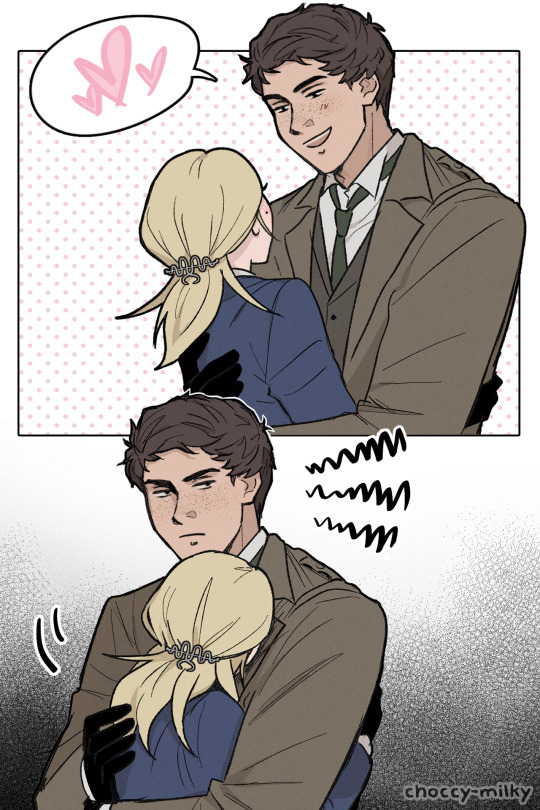
seb's 2 modes around clora 🥰👿
#now im just imagining clora trying to catch him glaring/making his scary face but every time she looks at him hes like 🥰#BAHAHA i need to draw that now...#this was originally supposed to be them at school but I CRAVE MORE OLDER SEB 🧎♀️🧎♀️🧎♀️#i say despite putting off working on my oneshot which HAS older seb#fun fact 90% of the writing process is THINKING about writing instead of ACTUALLY writing😍#choccy tip of the day☝️#hogwarts legacy#sebastian sallow#sebastian sallow x oc#sebastian sallow x mc#sebastian x mc#clora clemons#choccyart
1K notes
·
View notes
Text
Symbolism in Writing
Weather Symbolism
Rain: cleansing, sadness, renewal, obstacles
Sunshine: happiness, hope, clarity, energy
Storms: conflict, turmoil, dramatic change
Snow: purity, stillness, coldness, isolation
Fog: confusion, mystery, uncertainty
Wind: change, freedom, unrest, communication
Animal Symbolism
Eagle: freedom, vision, strength, courage
Lion: bravery, power, leadership, pride
Dove: peace, love, innocence, spirituality
Wolf: loyalty, cunning, survival, community
Snake: transformation, danger, temptation, wisdom
Butterfly: transformation, beauty, impermanence
Plant Symbolism
Rose: love, beauty, passion, secrecy
Oak Tree: strength, endurance, wisdom
Willow Tree: sadness, flexibility, resilience
Lotus Flower: purity, enlightenment, rebirth
Ivy: friendship, fidelity, eternity
Cactus: endurance, protection, warmth
Object Symbolism
Mirror: self-reflection, truth, illusion
Key: opportunity, secrets, freedom
Bridge: connection, transition, overcoming obstacles
Candle: hope, spirituality, life, guidance
Clock: time, mortality, urgency
Mask: disguise, deception, concealment
Number Symbolism
One: beginnings, unity, individuality
Two: partnership, balance, duality
Three: creativity, growth, completeness
Four: stability, order, foundation
Five: change, adventure, unpredictability
Seven: mystery, spirituality, luck
Season Symbolism
Spring: renewal, birth, growth, hope
Summer: vitality, abundance, joy, freedom
Autumn: change, maturity, decline, reflection
Winter: death, stillness, introspection, endurance
Light and Darkness Symbolism
Light: knowledge, purity, safety, enlightenment
Darkness: ignorance, evil, mystery, fear
Shadow: the unconscious, secrets, mystery
Twilight: ambiguity, transition, mystery
Element Symbolism
Fire: passion, destruction, energy, transformation
Water: emotion, intuition, life, change
Earth: stability, grounding, fertility, growth
Air: intellect, communication, freedom, change
#writing#writerscommunity#writer on tumblr#writing tips#character development#oc character#writing advice#writing help#writer tumblr#writblr
10K notes
·
View notes
Text
Reblog your own posts. Like all the time if you want.
This site isn't algorithmic sometimes if you miss it you just miss it.
But reblog your old fics and old pieces. Reblog your own funny text posts. It's not embarrassing and honestly if you're a content creator, I suggest you get into the habit of doing it every once in a while because if it's not on a master list I think there's whole posts your new followers will just never see
You work hard on stuff and the internet teaches us that content is only good for a week before it spoils and that's just not true.
#Tumblr tips#fanfic meta#fanfiction#fanfic writing#fanfic#marvel fanfic#ocs#oc art#fanart#marvel fanart#writing tips#art tips
2K notes
·
View notes
Text
Get to Know Your Character #2
More asks!
What good/bad traits do they bring out in others?
What views do they have that differ from/contradict those of the other characters?
What would be their reason for causing a scene in public?
What qualities do they look for or value in a partner/friend?
What do they consider red flags in a partner/friend?
What is something you should never do to them?
What is their most important or enforced boundary?
What would break them?
What would push them to physical altercation or violence during an argument?
How do they act in their worst moments?
What embarrasses them the most?
What joke would amuse them?
What does it take to gain their trust?
In what scenario would they feel most comfortable?
In what scenario would they feel most uncomfortable?
How do they take criticism?
What part of their past are they most ashamed of?
What part of their past are they most proud of?
What do they believe is the worst fate one can befall?
How do they view death?
See my previous post for more:
Happy writing ❤
Previous | Next
#writeblr#writing#writing tips#writing help#writing resources#creative writing#character development#oc development#ask game#oc ask game#writer ask game#deception-united
1K notes
·
View notes
Text
My Yuusona… This is so cringe & ugly, but I am free…..
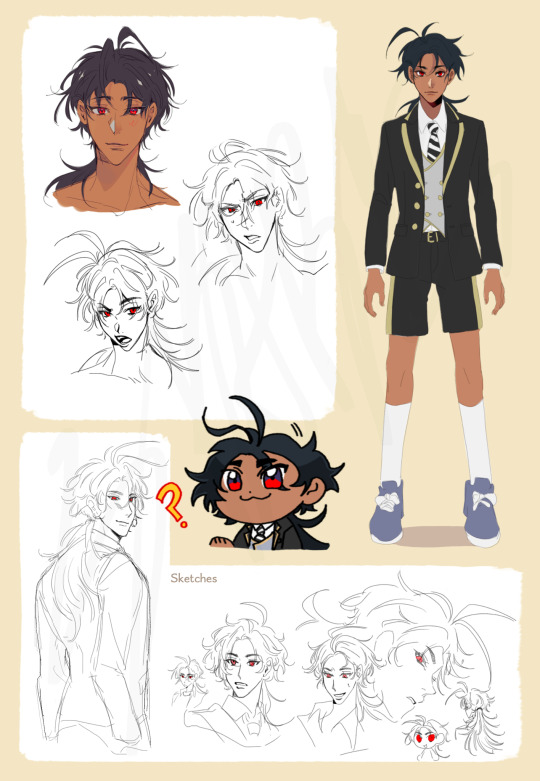
People have such scrumptious yuus and ocs, and look at this abomination
I don’t have a name, or any info about them, but I’ve been aching to create a yuu oc, because the persona I’ve been using is so simple
ITS SO BASIC HHHHH
Might just go back to drawing people’s ocs and pretend this never existed because what is this (also hi! Back again so soon ^^) - ♠️
#twst oc#twisted wonderland#twst#twst yuu#yuusona#oc#twisted wonderland oc#why are they so hhideeousss#i need tips and tutorials on how to draw and design anything hhhh…#how do people use &write tags?..?
274 notes
·
View notes
Text
Opposing Qualities for your Characters!
I always advocate the concept of Traits and their Inverses when making characters. If you're familiar with my blog, you'll know that in one of my posts, I've told you to use opposing qualities when you make a character to make them real. Here's a link to that post if you haven't come across it yet so you can understand this better: https://www.tumblr.com/coffeetank/747126821111447552/build-characters?source=share ~ List of more opposing qualities to give your characters: persuasive :: manipulative (your character has a way with words and sometimes uses this to get away with things)
humble :: underconfident (your character does not have an ego at all, but they are in actuality always underconfident - show how this can affect their surroundings especially in a situation where others depend on them)
independent :: alienated (your character can do everything on their own and quite literally does not need anyone around, show how this can crossover over with alienation - dig into the emotional background of this supposed crossover)
curious :: invasive (your character has an appetite for knowledge, but they forget boundaries - show how this can get them into trouble)
daring :: reckless (your character has a strong spirit and isn't scared of taking risks, but this can always incline to the bad side and cause them harm - use this to especially add event and conflict in the story)
neutral :: retracted (your character prefers to see both sides before coming to a conclusion and stays neutral 99% of the times, but then when one side needs them more than the other they refuse to acknowledge that need and pull themselves out of that situation - show how this this can affect their relationships with other people especially on a moral ground)
emotional :: irrational (it's always good for your character to have emotional capacity, but it can hinder with their practical side for sure - show how this plays out)
unique :: aberrant (your character has a very solid personality but then some their quirks are too odd to be normal - this is good for revealing an undercover villain/agent/supernatural being later in the story as a twist)
optimistic :: unserious (your character is a positive person, but they take life too lightly sometimes - play with it!)
appealing :: deceptive (your character is absolute delight to be around and wins hearts in an instant - show how they use this power of their to deceive people for their own benefit)
hopeful :: expectant (your character wishes for the bright side - show how this can transverse into having unfulfilled expectations thus making them act out wrongly due to disappointment)
clever :: cunning (as obvious as it sounds, your character uses their intelligence for the wrong - bonus if you mix this with another set of opposing qualities to add depth and layers to your characters)
short-tempered :: violent (easy, simple and impactful; your character loses temper quickly but they damage things around them with every small/big outburst)
Feel free to use these as you'd like! I'll bring you more soon.
-ashlee
#writers on tumblr#writerscommunity#writing#writer#books#write#writingtips#creative writing#fanfic writing#fanfic#drabbles#tips#tricks#tips and tricks#writing advice#writing ideas#characters#fictional characters#character sheet#character creation#plotting#urban fantasy#tropes#original characters#oc#fiction#author#fiction stories#writing prompt#writing blog
573 notes
·
View notes
Text
50 Dark Academia Names For Your Female Characters + Meanings & Origins
Alecto - unceasing in anger (Greek mythology)
Ariadne - most holy (Greek mythology)
Cassiopeia - she who entangles (Greek mythology)
Circe - hawk (Greek mythology)
Drusilla - dewy-eyed (Roman)
Eris - strife (Greek mythology)
Fionnuala - fair shouldered (Irish)
Galatea - she who is milk-white (Greek mythology)
Hekate - will (Greek mythology)
Idony - ancient wisdom (Scandinavian)
Isolde - ice battle (Arthurian)
Kore - maiden (Greek mythology)
Lenore - light (Spanish/French)
Lilitu - monstrous woman (Mesopotamian mythology)
Maeve - she who intoxicates (Irish)
Nyx - night (Greek mythology)
Orion - rising (Greek mythology)
Pandora - all-gifted (Greek mythology)
Queenie - noble queen (English)
Rhaenyra - dark reign (Game of Thrones)
Selene - moon goddess (Greek mythology)
Themis - justice (Greek mythology)
Ursula - little female bear (German)
Valeria - strength (Roman)
Willow - willow tree (English)
Xanthe - golden flower (Greek)
Yseult - ice battle (Arthurian)
Zelda - dark battle (Germanic)
Zephyrine - from the west wind (Greek)
Aella - whirlwind (Greek mythology)
Brynhild - armored battle maiden (Norse mythology)
Catriona - pure (Scottish Gaelic)
Deirdre - sorrowful (Irish)
Elspeth - God's promise (Scottish)
Felicity - good fortune (Latin)
Gwendolyn - white ring/circle (Welsh)
Harlow - rock clearing (English)
Idalia - from Idalium (Greek mythology)
Jericho - scent of beauty (Hebrew)
Kalliope - beautiful voice (Greek mythology)
Lumen - light (Latin)
Morana - death (Slavic mythology)
Nerissa - mermaid (Greek mythology)
Octavia - eighth (Roman)
Persephone - bringer of death (Greek mythology)
Quintessa - fifth (Latin)
Seraphina - fiery serpent (Hebrew)
Theda - goddess (Greek)
Umbriel - shade (Roman mythology)
Xenia - hospitality (Greek)
#creative writing#thewriteadviceforwriters#writing#writing tips#writers block#how to write#writeblr#on writing#writers and poets#witchcore#oc names#name suggestions#character names#girl names#character development#character design#original character#writing blog#writers on tumblr#novel writing#writerslife#writerscommunity#writersociety#writing advice#writers#female writers
921 notes
·
View notes